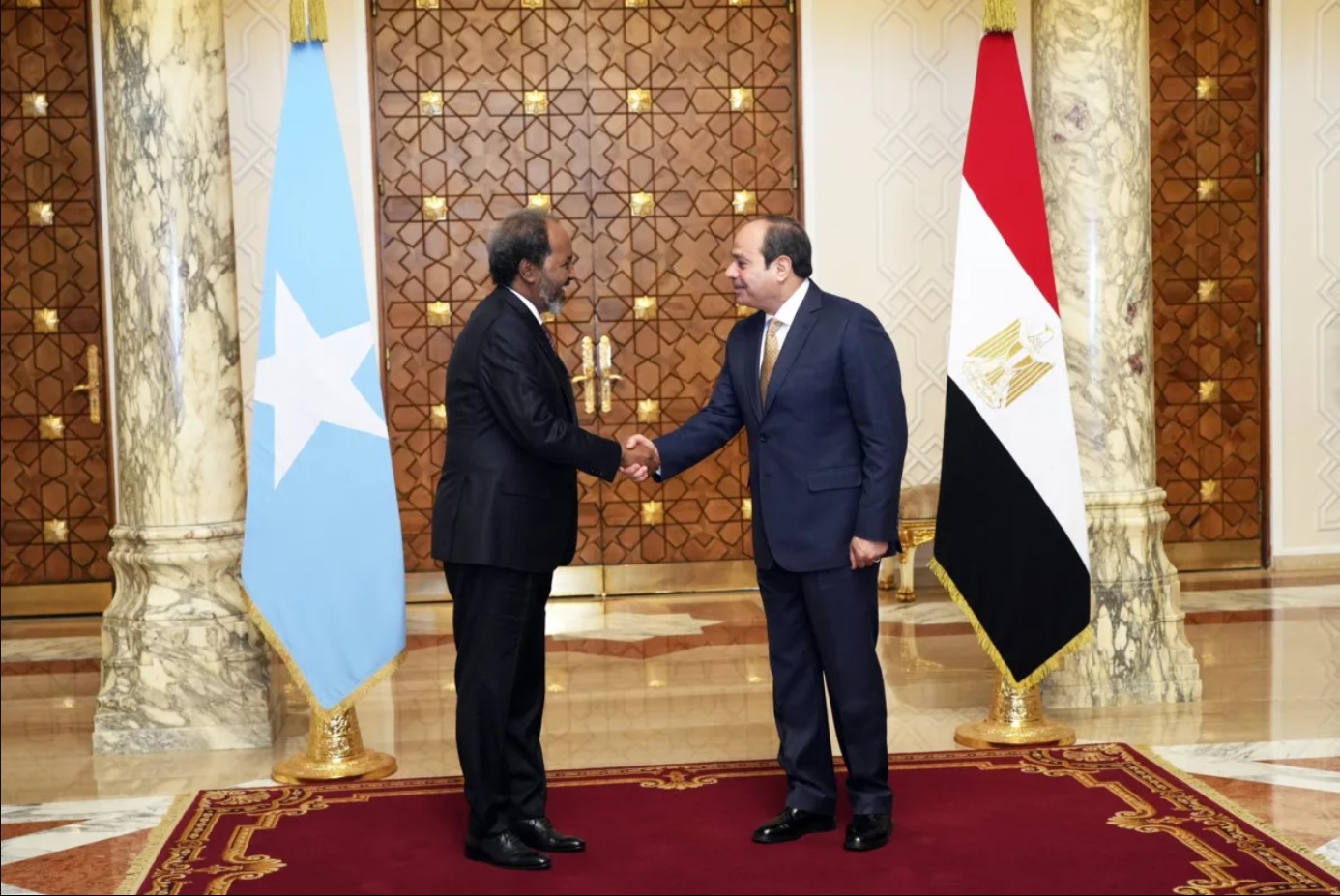Egypt and Somalia have signed a significant defense agreement, reinforcing their strategic ties amid ongoing tensions with Ethiopia.
The treaty was formalized with Egyptian President Abdel Fattah Al-Sisi on 14 August during Somali President Hassan Sheikh Mohamud’s two-day visit to Cairo.
Context of the Agreement
The defense pact comes at a time of heightened tensions between Somalia and Ethiopia, particularly after Ethiopia’s recent deal with Somaliland in January.
A surprising memorandum of understanding between Ethiopia and Somaliland has intensified tensions in the Horn of Africa, with potential wider implications. Somaliland, a former British colony along the Gulf of Aden, declared independence from Somalia in 1991, though no country has officially recognized it. Despite this, Somaliland has attracted significant foreign investment, partly due to its strategically located Berbera port.
On 1 January, Somaliland announced an agreement to lease land to Ethiopia for the construction of a naval facility on its coast in exchange for Ethiopia’s recognition of its statehood. This deal has angered Somalia, which views Somaliland as part of its territory and fears Ethiopia’s growing influence might threaten its sovereignty, and Somalis went out to the streets to protest the new deal.
The crisis could escalate, as Somalia is mobilizing international opposition to the agreement, while Ethiopia and Somaliland seem determined to proceed.
This agreement granted Ethiopia access to 20 kilometers (approximately 12.43 miles) of Somali coastline, where it plans to construct a naval base. The move has been met with strong condemnation from Somalia, which sees it as an attempt by Ethiopia to annex Somali territory. Egypt, which also opposes the Ethiopian move, has voiced its support for Somalia’s territorial integrity.
Somaliland remains unrecognized by the international community, further complicating the regional dynamics.
Statements from Leaders
Following their meeting, President Al-Sisi reaffirmed Egypt’s support for Somalia’s unity and sovereignty, emphasizing his opposition to any external interference in Somalia’s internal affairs. He also highlighted the significance of the defense agreement as part of a broader strategy to strengthen regional stability.
President Mohamud, on the other hand, focused on the counter-terrorism components of the treaty, describing it as a “testament to a future of common defense against the international terrorism we are combating both at home and abroad.” This statement comes in the wake of a deadly attack by the extremist group Al-Shabaab in Mogadishu’s Lido Beach earlier this month, which resulted in 37 deaths and over 200 injuries.
Broader Regional Implications
The defense agreement is not only a response to the situation in Somalia but also reflects Egypt’s own strategic concerns regarding Ethiopia. Egypt remains in a protracted dispute with Ethiopia over the construction of the Grand Ethiopian Renaissance Dam (GERD) on the Blue Nile, which Cairo fears could significantly reduce its vital water supply.
Furthermore, Egypt perceives Ethiopia’s plans to establish a naval base on Somali territory as a potential threat to its influence in the Red Sea. Landlocked Ethiopia currently relies on Djibouti for access to the Red Sea, but strained relations with Eritrea make diversified maritime access critical for Addis Ababa.
The signing of the defense pact follows Somalia’s recall of its ambassador from Addis Ababa in April, signaling a deepening rift between the two neighbors. Egypt’s strong support for Somalia’s position further aligns the two countries against Ethiopian ambitions in the region.
Ethiopian Prime Minister Ahmed Abiy and Somaliland’s President Bihi have hailed their recent agreement as a significant achievement for their national objectives. For Ethiopia, this means restoring access to the sea, while for Somaliland, it represents a step towards gaining international recognition.
Ethiopia, with a population of around 120 million, is the world’s most populous landlocked country, having lost its coastline when Eritrea gained independence in 1993. Over the past two decades, Ethiopian governments have expressed concern about the country’s heavy reliance on Djibouti’s port, which handles the majority of Ethiopian trade.
Prior to the January agreement, Ethiopia’s closest attempt at securing port access was a 2017 deal with Somaliland, in which Addis Ababa was set to acquire a 19 percent stake in the Berbera port. However, this agreement fell through, reportedly due to Ethiopia’s failure to make timely payments.
Planning Ahead
As tensions continue to simmer in the Horn of Africa, the newly signed defense pact between Egypt and Somalia underscores the complex geopolitical dynamics at play.
Both nations are likely to leverage this agreement as a means to bolster their security and regional influence in the face of shared concerns over Ethiopia’s growing assertiveness.







Comments (0)